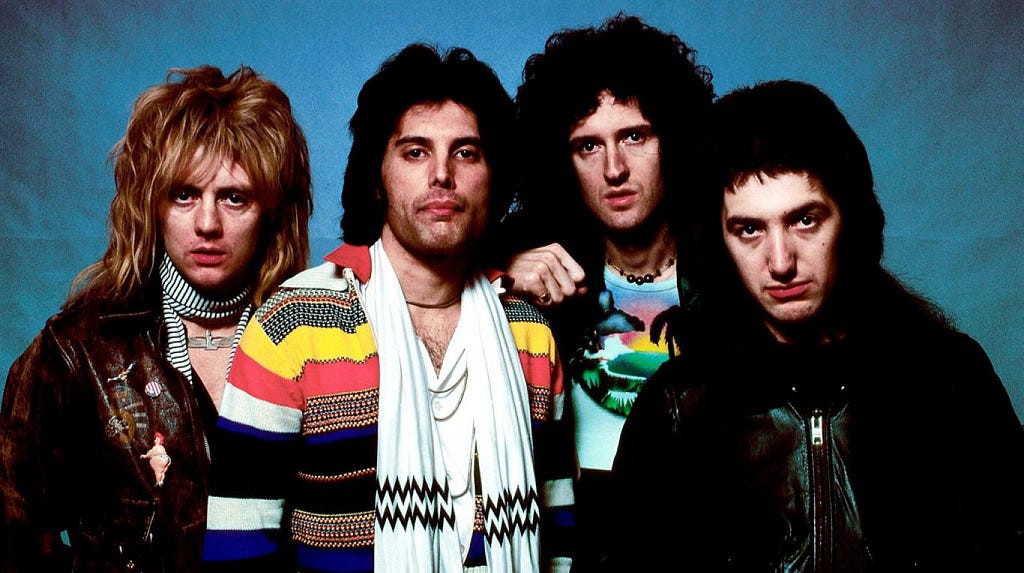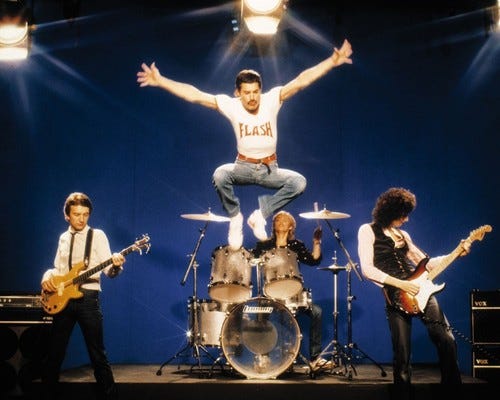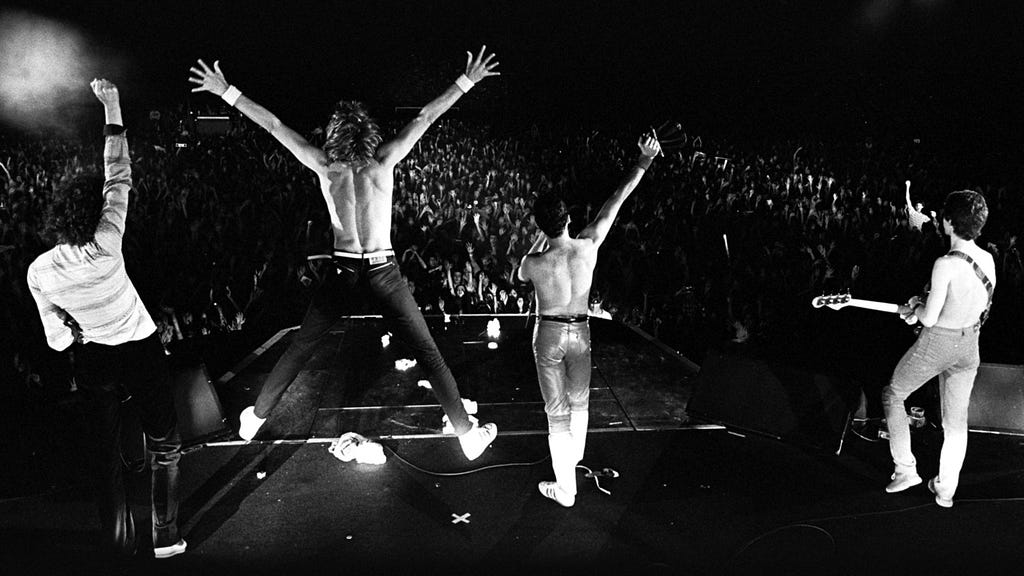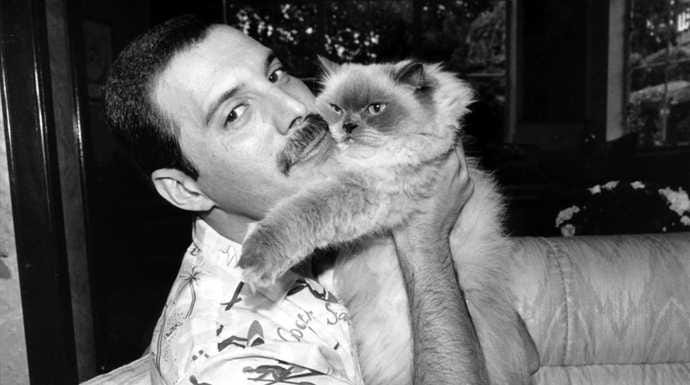5 Business Lessons from the Music of Queen

Like millions of other Americans this weekend, I went to see Bohemian Rhapsody, the recently released biopic about Queen. The movie was so bad, I melted into uncontrollable giggles at its most serious moments. After two and a half long hours, I was fed up by overdramatic montages, a meandering plotline, and undisciplined editing, so I walked out before the completion of the film. As it turns out, so did the Director — which explains a lot about why it was so terrible.
What it does not explain is why I have been nonstop, obsessively thinking about Queen ever since. The more I read about them, the more I listen to their albums, the more I watch their performances, the more memories come flooding back to me.
The first time I heard “Bohemian Rhapsody”, it was the early nineties and my Grandma brought over a copy of Wayne’s World. You might find this odd, since I was somewhere around five years old at the time, but she insisted we would like it since it was based in the glorious town of Aurora, Illinois, only a few miles from where we lived.
I do not remember when she realized I was way too young to be watching Wayne’s World. What I do remember is re-enacting that opening scene for years afterward, belting “Galileo!” at the top of my lungs, packed into the backseat of shitty cars all over the Midwest. I remember stomping my feet to“We Will Rock You” before my high school basketball games, and “We Are the Champions” after we had won. I remember debating in an ethics class at Harvard whether or not it was okay that Vanilla Ice had stolen the opening riff of “Under Pressure” for “Ice Ice Baby”. I remember watching countless newly married couples dancing to “You’re My Best Friend.”
How could Queen have somehow woven themselves into the fabric of my entire life without me even realizing it? You might not think about them very much either, but Queen is actually everywhere. They have sold over 300 million albums worldwide. They have spent more time on the British charts than The Beatles. They have been featured in over 375 films.

The Quiet Genius of a Very Loud Band
As romantic as music can be, it is a business. A band is a company. The members are a team. Instruments are features. Songs are products. Concerts are experiences. In either case, music is the heart and soul.

Just like the record labels, venture capital is notorious for constantly being on the hunt for the next big hit. However, we are not looking for one hit wonders. We are looking for generation defining technologies; the companies that change the shape of our lives without us even realizing it; the experiences that find their way into the deepest crevices of our memories that we don’t even know they’re there. Basically, we are looking for the nerd’s equivalent of Queen.
So what can we learn from Queen? What makes them so special that they’ve been able to transcend time, genre, and space? Why does it matter if you’re not a musician? Whether you are in the music, technology, venture, or any human business, here is what we can all learn from Queen.
1. Team is everything — diversity is required.
Queen consisted of four musicians with very unique strengths: Freddie Mercury (vocalist, background in design), Brian May (guitarist, PhD in astrophysics), Roger Taylor (drummer, tried dentistry but got a BSc in Biology) and John Deacon (bass, background in electronics). Though he was often the face of the band, Freddie Mercury once famously said in an interview, “I’m not the leader of the band, I’m the lead singer.” He recognized he was nothing without his team.
In fact, Queen’s greatest hits were written by all members of the band. Freddie wrote “Bohemian Rhapsody”, Brian May wrote “We Will Rock You”, Roger Taylor wrote “Radio Ga Ga”, and John Deacon wrote “Another One Bites the Dust” and “I Want to Break Free”.
A truly remarkable team requires members with unique strengths, diverse backgrounds, and a shared commitment to making music. When a team like this comes together, individual intelligence transforms into collective magic.

2. Innovation requires commitment and constant experimentation.
Queen was formed in 1970, but they didn’t release their first album until 1973. They hustled their way into the only slot available at a friend’s recording studio, which required them to record from 3–6am. This is ultimately how they got noticed — they were very loud at a very quiet time.
“Bohemian Rhapsody” was recorded in 1975, though Freddie Mercury had been writing versions of the song (initially called “The Cowboy Song” for the opening line) for nearly ten years before the band ultimately recorded the hit. Once they did record it, the track notoriously took three grueling weeks to lay, with sessions ranging from ten to twelve hours per day. In some sections, it featured 180 separate overdubs. Yes, the final product was epic, but it took years of imagination, hard work, iteration, and experimentation.
Whether you are a band or a business, nothing world-changing is built overnight. It’s not about what you want — everyone wants massive success — it’s about what you’re willing to give up to get there.
3. Find your audience — sing to them, love them, engage them, and empower them.
In 1970, Queen started by playing to college audiences because it is what they knew and where they were accepted. After all, they were students themselves. As they grew and evolved, their audience grew with them — their fans graduated from college just as Queen was graduating to real concert venues. They got married and had kids as Queen continued to pump out hits, and it was these same fans that brought their kids to concerts when the band started playing in stadiums all over the world. It was Mike Myers, who had listened to Queen growing up, that threatened to walk off the set if “Bohemian Rhapsody” was not included in Wayne’s World, ultimately leading to the song’s second run at the top of music charts nearly twenty years after its initial release.
Queen had staying power because they were incredible at engaging audiences — not just figuratively through their lyrics, but quite literally in the performance of their music. Whether it was the stomp-stomp clap of “We Will Rock You”, the “Ey Oh” call at the beginning of “Under Pressure”, Freddie Mercury’s unforgettable exchange singing “Radio Gaga” with an audience of over 70,000 people at LiveAid in 1985, Queen rarely sang alone.
Though their power fans were small in the beginning, Queen serves as a reminder that if the most powerful companies speak directly to their users. If you can unify, engage, and empower customers, you will be filling stadiums for generations.

4. Don’t let your past define you.
Freddie Mercury was not born a British rock star. He was born in Zanzibar (now Tanzania) as Farrokh Bulsara. His family was originally from India and he spent his formative years in Mumbai until his family ultimately fled Africa for England in the late 1960’s. Given the constraints of coming from a traditional Parsi household and his conflicted identity as a gay man in a conservative society, he created Freddie Mercury as a way of liberating himself from where he came from.
Throughout my own life as a very American American who somehow found her way into the business of building global companies, I have learned that you are not defined by where you came from — you are defined by your choices, your mindset, and what you create. Most great filmmakers agree (if you need some good references, look for this theme in The Last Jedi and Bladerunner 2049).
Whether it is in the world of music, technology, or business, innovators are not constrained by their origins. The only way to find out what you truly can do is by letting go of what you were and what others tell you that you are. Farrokh Bulsara did just that, and thus Queen was born.
5. Embrace contradiction — turn ‘buts’ into ‘ands’.
So, what is it that makes Queen so fascinating that they have hijacked my ears and my mind not only this week, but arguably since I was five? How are they so subtly relevant today? Why are they everywhere and nowhere? Who else can possibly make grown men cry, and young women scream in the way that they do? What is it about them that seeps its way into our lives, no matter where we are or what kind of music we like?

Freddie Mercury was painfully shy, but somehow one of the best performers of all time. All the members of Queen were all highly intellectual, but also made head banging rock songs. Their lead singer was gay, but the love of his life was a woman. All four band members asserted they hated each other, but they also insisted they were family. A lot of Queen’s lyrics are gibberish, but their music is rich with meaning. Freddie Mercury died in 1991, but he sang alongside a captivated audience at the closing ceremony of the 2012 Olympics in London.
The answer to these questions, and the essence of Queen’s genius, is captured in a hotly contested scene in the movie about the release of Bohemian Rhapsody, in which Mike Myers (aka Wayne from Wayne’s World) insists that the song can never be a hit single because ‘it’s opera but it’s rock’, because it’s ‘six minutes long, but has no chorus’.
Once it was released, the length and unusual nature of the song forced Queen to market the song with a video — which is widely credited as the invention of the music video, seven years before MTV went on air.
What is it that made this level of innovation, depth, creativity, and longevity possible? Queen embraced their contradictions. They defied definition, they refused to be categorized — and thus created something truly new and meaningful. They worked really fucking hard in the process, and ultimately they turned ‘buts’ into ‘ands’. They are a rock band and they sing opera. Their lead singer was Farrokh Bulsara and Freddie Mercury. They possessed a rare level of intelligence, and they made universally accessible music. Freddie died of AIDS, and left his entire fortune to a woman (and cats).
Whether you are a musician, an entrepreneur, or just a regular person on the street, you can only innovate by embracing and exploring your inherent and inevitable contradictions. It’s not easy, and it’s the only way to change the world.
5 Business Lessons from the Music of Queen was originally published in Fusion by Fresco Capital on Medium, where people are continuing the conversation by highlighting and responding to this story.